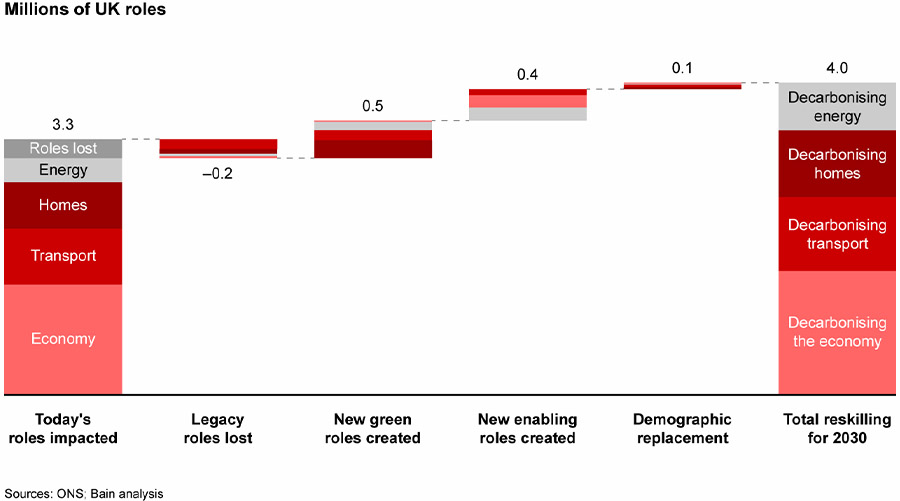Four million workers in the UK will need retraining by 2030 to support the nation’s transition to a low-carbon economy, according to a new research from Bain & Company. This will also see roughly one million roles created by the net zero transition in the same period – with energy and home heating creating 500,000 jobs alone.
By Bain & Company’s reckoning, it took the UK 60 years to reduce its coal usage 90%; and that shift to gas as a primary fuel in Britain came with massive social and economic impacts on the nation’s economy, politics, and communities – especially in the North, Midlands, and South Wales. This time, more is on the line, and there is even less time to do it.
“Any economic transition on this scale will have a disruptive impact on the workforce of a nation, but it is the unprecedented pace of the net zero transition that brings a unique set of challenges,” said Julian Critchlow, a Bain & Company partner in the firm’s Energy practice and a member of Bain’s Energy & Carbon Transition Centre. “This transition to net zero is set to take place within a period of just over a decade.”

The shift is also about more than just the energy sector, which represents only about 25% of the UK’s total CO2 emissions. As the UK looks to decarbonise its entire economy, if it is to do so without manifesting the colossal levels of inequality wrought by the previous energy transition, it will need to take particular care with how it relates to employment across the country.
Reskilling
Bain asserts that the UK is already off-track in this regard, and has significantly underestimated the scale of workforce reskilling required over the next decade. According to the firm’s latest analysis, these changes will require four million green roles to unlock the opportunities of the UK’s net zero transition – something which the UK’s training ecosystem is not in a position to handle. At the same time, further education will be needed to fill a further 1 million new sustainability driven roles by 2030.

Of these roles, the energy and home heating sector are set to provide more than 500,000 new roles alone, with a further 200,000 coming from efforts linked to decarbonising transport. As many as 170,000 new heat pump installer roles will be required, with gas boiler engineers able to retrain for these positions in about three days. In contrast, the transition is set to lead to 240,000 jobs being lost in carbon-intensive industries – most of all from disadvantaged regions already hit by the last transition from coal, such as Wales, the North East, and Scotland – and these workers will need help re-skilling and finding new roles too.
All this requires a closer partnership between the government and businesses to deliver net zero. To that end, Bain’s research identifies a number of potential policy levers that can help the UK to close the current skills gap and accelerate its progress towards net zero.
These include green reskilling demand incentives – as used by the US Federal Government – which can encourage companies to add green reskilling into their procurement processes. Bain also recommends a ‘green champions scheme’, offering opportunities for public training and workforce development. This would encourage private business participation, with the government offering financial support and holding companies accountable through skills reporting metrics. And ‘fit-for-the-future’ training pathways could be introduced to boost workers’ confidence in reskilling – producing a national ‘skills passport’, similar to Scotland’s initiative for transitioning oil and gas workers.




